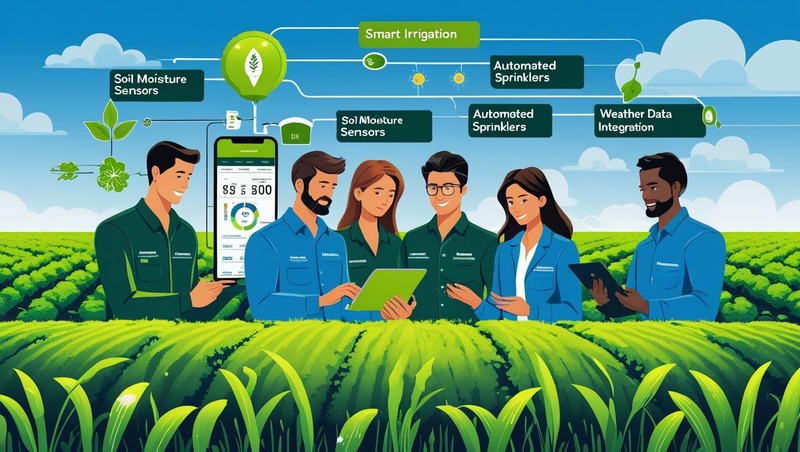Artificial Intelligence (AI) is revolutionizing industries across the globe, and agriculture is no exception. One of the most transformative applications of AI in agriculture is in smart irrigation systems. As water scarcity intensifies and climate change disrupts traditional farming practices, the global smart irrigation market is experiencing rapid growth, with AI at the forefront of this evolution. AI technologies are empowering farmers and agricultural stakeholders to make data-driven decisions, enhance resource efficiency, and improve crop yields through precise irrigation techniques.
Smart irrigation involves the use of advanced technologies such as sensors, weather forecasting systems, and data analytics to automate and optimize irrigation processes. However, the integration of AI elevates this system by adding a layer of intelligence that allows real-time analysis, predictive modeling, and autonomous decision-making. AI algorithms process large datasets collected from soil moisture sensors, satellite imagery, historical weather data, and crop health reports to determine the exact amount of water required by crops at specific times. This not only conserves water but also ensures optimal crop health and productivity.
Download PDF Brochure @ https://www.marketsandmarkets.com/pdfdownloadNew.asp?id=199758913

One of the key advantages of AI in smart irrigation is its ability to enable predictive irrigation scheduling. Traditional irrigation systems rely on fixed schedules, which often result in overwatering or underwatering, leading to wasted resources or reduced crop quality. AI-driven smart irrigation platforms analyze patterns and forecast future conditions, such as rainfall probability, humidity levels, and evapotranspiration rates, to adjust irrigation in real-time. This dynamic approach minimizes water wastage and supports sustainable farming practices, especially in water-stressed regions.
Furthermore, AI facilitates precision agriculture by tailoring irrigation strategies to specific crop types, soil characteristics, and field zones. Through machine learning models, smart irrigation systems can identify variations within a field and deliver water accordingly. For instance, a field with sandy soil may require more frequent irrigation than one with loamy soil. AI ensures that such nuances are addressed, thereby maximizing water use efficiency and supporting healthy crop growth across diverse agricultural landscapes.
AI also enhances the scalability and flexibility of smart irrigation systems. With cloud computing and Internet of Things (IoT) integration, AI-based platforms can be accessed remotely, giving farmers the ability to monitor and control irrigation systems from mobile devices or computers. This level of accessibility not only saves time and labor but also allows for better management of large-scale farms and plantations. Remote diagnostics and automated alerts powered by AI further reduce downtime and maintenance costs by identifying system faults or anomalies before they escalate into critical issues.
In addition to water management, AI contributes to cost savings and increased return on investment (ROI) for farmers. By optimizing irrigation practices, AI reduces input costs associated with water, energy, and labor. Healthier crops and higher yields result in improved marketability and profitability, making AI an economically viable solution for both smallholder and commercial farmers. Governments and agricultural organizations are also promoting AI-based irrigation solutions through subsidies and policy support, accelerating market adoption globally.
The impact of AI on smart irrigation extends beyond individual farms to regional and national levels. AI-powered analytics can aggregate data across multiple farms to identify macro trends in water usage, crop performance, and climatic changes. This aggregated data aids policymakers and researchers in devising strategies to address water scarcity, food security, and climate resilience. As a result, AI not only transforms on-farm irrigation but also plays a pivotal role in shaping sustainable agricultural ecosystems.
Despite the promising benefits, the adoption of AI in smart irrigation faces challenges such as high initial investment costs, lack of digital literacy among farmers, and limited access to reliable internet in rural areas. However, advancements in affordable AI tools, increasing smartphone penetration, and government initiatives aimed at digital agriculture are gradually overcoming these barriers. The development of user-friendly interfaces and multilingual support is also helping bridge the technological gap for farmers in emerging economies.
Frequently Asked Questions (FAQs) on the Smart Irrigation Market
- What is smart irrigation?
Smart irrigation is an advanced method of watering that uses technologies like sensors, weather data, and AI to automate and optimize water usage based on real-time environmental conditions, resulting in efficient water use, improved crop yield, and reduced wastage. - How does smart irrigation work?
Smart irrigation systems use soil moisture sensors, weather forecasts, and plant data to determine when and how much water to deliver; this data is processed by AI or automated controllers to adjust irrigation schedules, reducing manual intervention and conserving water. - What technologies are used in smart irrigation systems?
Smart irrigation systems integrate IoT-based sensors, weather forecasting modules, AI algorithms, mobile apps, soil moisture probes, and automated valves to collect data and manage irrigation intelligently across agricultural and landscape environments. - What are the benefits of smart irrigation?
The key benefits include water conservation, enhanced crop productivity, lower utility bills, reduced labor costs, real-time monitoring, and environmentally sustainable water usage for both agriculture and landscaping applications. - Which sectors use smart irrigation solutions?
Smart irrigation is used in agriculture, residential lawns, commercial landscaping, golf courses, parks, sports fields, and municipal green infrastructure, helping improve water management and plant health across a wide range of settings. - What role does AI play in smart irrigation?
AI in smart irrigation enables predictive decision-making by analyzing environmental data, forecasting weather patterns, and automating irrigation schedules to deliver water efficiently, minimize waste, and support precision farming practices.
See The Latest Semiconductor Reports:
Edge AI Hardware Market by Device, Processor (CPU, GPU, and ASIC), Function, Power Consumption (Less than 1 W, 1-3 W, >3-5 W, >5-10 W, and More than 10 W), Vertical and Region – Global Forecast to 2030
Precision Farming Market by Automation & Control Systems, Cloud-based Software, System Integration & Consulting Services, Guidance Technology, Variable Rate Technology, Yield Monitoring, Field Mapping, Variable Rate Application – Global Forecast to 2032
